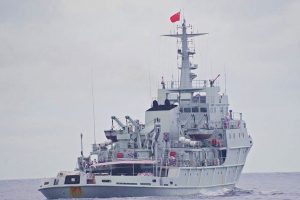
PHL seeks to boost German ties beyond training
THE PHILIPPINES seeks to expand its defense cooperation with Germany “beyond training” to cover cybersecurity and maritime domains, President Ferdinand R. Marcos, Jr. said on Wednesday, amid rising tensions with China.
The Southeast Asian nation is ready to take their defense ties to the next level, he said in a joint press statement with German Chancellor Olaf Scholz after their meeting in Berlin.
“I expressed the Philippine government’s openness to discussions on cooperation that goes beyond training and into new areas such as cyber- and maritime domains,” he said.
Germany is the Philippines’ second-oldest defense partner, having trained the Armed Forces of the Philippines since 1974.
“I am heartened by Germany’s increased interest in enhancing maritime cooperation between our countries, and I welcome more initiatives to enrich this partnership,” Mr. Marcos said.
Before the Philippine leader arrived in Berlin, the Philippine Transport department and its German counterpart signed a deal to enhance their cooperation at sea.
The Philippines has been turning to the United States and other western nations amid China’s increased assertiveness in the South China Sea. Before flying to Germany on Monday, Mr. Marcos said the Philippines seeks to boost economic ties with “like-minded” nations.
The Philippine military on Tuesday said it had spotted about 50 Chinese vessels within the country’s exclusive economic zone (EEZ) in the South China Sea, many of them near the disputed Scarborough Shoal.
Mr. Marcos said he and the German chancellor had agreed to expand coast guard exchanges, citing the need to keep the South China Sea “a safe passage” for international commerce.
“It has to be recognized that the South China Sea handles 60% of the trade of the entire world,” he said. “So, it’s not solely the interest of the Philippines, or of ASEAN (Association of Southeast Asian Nations), or of the Indo-Pacific region but the entire world.”
Mr. Scholz said tensions in the South China Sea and Taiwan Strait would be tackled during his visit to China.
The German leader reiterated the need to uphold an international rule-based order and respect international law including the United Nations Convention on the Law of the Sea.
China has rejected a 2016 arbitral ruling by a United Nations-backed court that voided its claim to more than 80% of the South China Sea.
A Chinese envoy said earlier this year the two countries’ relations were at a crossroads. The Philippine Foreign Affairs department last week said it had filed nine diplomatic protests against China this year, bringing the total since Mr. Marcos assumed office in July 2022 to 142.
During his visit to the Philippines in January, German Foreign Minister Annalena Baerbock hit the Chinese Coast Guard’s actions against Philippine vessels, including its use of lasers and water cannons.
Its irresponsible actions were causing concern in Europe, she said at that time.
At least four Philippine Navy officers were injured early this month after China’s coast guard fired water cannons at one of two wooden civilian boats used in a resupply mission for Filipino troops at a remote outpost in the South China Sea, according to the Philippine National Security Council.
The water cannons from two Chinese Coast Guard vessels shattered the windshield of Unaizah Mae 4, causing minor injuries to the officers on board, it said.
It also accused a Chinese coast guard vessel of executing “dangerous maneuvers” against the escort ship, leading to a minor collision that resulted in “superficial structural damage” to the hull of the Philippine Coast Guard vessel.
The incident happened while President Ferdinand R. Marcos, Jr. was in Melbourne for a three-day summit between Australia and Southeast Asian nations. On March 4, he vowed to push back if China continues to violate Philippine sovereignty and sea rights. — Kyle Aristophere T. Atienza



